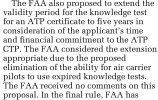Over the weekend I drafted and filed with the FAA a petition for
rule making asking that they extend the validity of FAA written tests
from the current two years to something more reasonable.
https://downloads.regulations.gov/FAA-2024-0001-0001/attachment_1.pdf
As explained in the petition, two years is incredibly arbitrary. It's
been in place since 1961 without modification, despite that the newer
ATP written is good for five years.
Why this matters to our members is that the two year limit often means
that they need to refrain from studying until they are closer to their
practical check-ride. Otherwise, they risk having the written expire
before they can take the check-ride forcing them to repeat it. This is
especially true for our younger members who can solo at 14 but cannot
take the check-ride until 16. At that stage, it can be difficult to
force yourself to hit the books again. We've lost a lot of members this
way. Having to refrain from studying hardly fosters learning and
aviations safety.
If this sounds like something you care about, and I hope you do, you can
help by posting a comment. Personalized comments that explain how this
effects you are the best. To comment:
https://www.regulations.gov/commenton/FAA-2024-0001-0001
HNY!
Stephen

